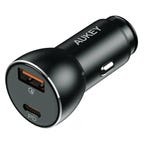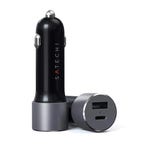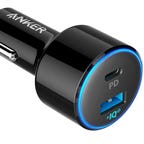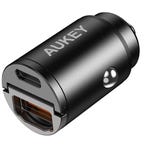Best USB-C Car Charger for Your iPhone or Android Phone
Here are the best USB-C car chargers to keep your devices topped off while you're on the go.
Our Picks
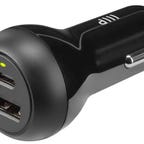
It's good to have a backup charger with you wherever you go. Between flipping through Spotify and navigation, it's easy to drain your phone's battery. That's why it's important to invest in a car charger that can keep your phone going, for everyday tasks as well as road trouble or emergencies.
Fortunately, car charger tech has improved. You can now get some high wattage options for maintaining the charge on your phone or rapidly juicing up another device. You'll definitely want to invest in a dual-port charger you can plug in to your vehicle's 12-volt adapter (or "cigarette lighter," if you're old school). And having one that can charge multiple devices simultaneously is a huge perk when you're on the go -- and possibly a lifesaver.
Historically these were two or more USB-A ports, the wide rectangular connection we've had on nearly everything for decades. More recently, there've been a growing number of USB-C options. USB-C, the small, rounded-off rectangle, is found on nearly all cell phones (including -- now -- Apple), tablets, laptops and more. It's basically the new standard in everything but name.
We decided to focus on chargers that have one of each, as this gives you the flexibility to charge newer USB-C devices, plus a "legacy" USB-A port that can connect to any USB devices as long as you have the right cable. (You can always pick up dongles or adapters, too, to go from USB-C to USB-A or USB-A to USB-C.)
In our testing, there wasn't a huge difference in charging times between the models we tested, though some were faster than others.
The Aukey CC-Y48 48W Dual Charger was just a few seconds behind the Satechi in charging speeds. However, it's a lot cheaper and not as tall. It also supports both the QC and PD charging protocols, so it should fast-charge a wider variety of phones and other devices. It offers a lot of benefits for being just fractionally slower in our testing, plus it's one of the cheapest car chargers we tested. An all-around easy choice.
Runner up
Satechi ST-TCPDCCS (72W)
While all the chargers we tested charged with fairly similar rapidity, the Satechi charged two devices at the same time the fastest… by a few seconds. But a few seconds is a few seconds. It has a fairly typical torpedo shape, but is taller than the others we tested. That may be a strength or weakness, depending on your car's layout. It's on the expensive side of the chargers we tested, but wasn't the most expensive either.
The Satechi doesn't support the QC fast charging protocol, so if your phone only supports that, check out the Aukey instead. Overall, this is a good charger if you don't mind the height, and a great charger if that height fits your car better.
The Amazon option
Anker PowerDrive Speed Plus (49W)
This Anker performed in the middle of the pack in our testing, which in fairness meant just a few minutes behind the leaders. However, its price at the time was the highest of any we tested. It is also the largest, with the output end roughly twice as wide as the barrel. Not a bad charger by any stretch, and if it was cheaper than our winners here, it'd be a great alternative.
Unlike many of the other options we tested, this one is still available on Amazon, too. This similar Anker model is a bit more affordable.
Smallest USB car charger tested
Aukey CC-A3 Dual-Port Car Charger (30W)
The Aukey CC-A3 is absolutely tiny. In most cars it will likely remain flush with the top of the 12-volt socket itself. To remove it, there's a small handle that pivots up when needed, and folds down flush with the top when not in use. It's a clever design. It's also the second-slowest charger we tested. That equates to about 10% longer to 50% capacity. However, the small size likely makes up for that speed difference.
The CC-A3 supports both the QC and PD fast charging protocols.
Budget car charger pick (Update: Out of Stock)
Monoprice 2-Port USB Car Charger (39W)
Monoprice has developed a reputation for decent products at low prices, and this charger is a pretty good example of that. Speed-wise it was mid-pack, a few minutes slower than the best, a few minutes faster than the worst. However, at $13 at the time this is published, it's one of the cheapest options here, less than half of the Satechi and in between the price of the two Aukey models at the time of testing.
The Monoprice only supports the PD fast charging protocol.
Other products we tested
Wotobeus PD 65W: The Wotobeus offered a splash of color in the form of a removable silicone sleeve that covered the larger half of the charger. Despite having the highest claimed wattage rating (83!), it actually charged the slowest in our testing. This, combined with a price the same as some faster chargers, put it out of the running.
How we test car chargers
We performed both synthetic and real-world testing for all the chargers we considered. Using a MakerHawk Electronic Load Tester, an Uctronics Electronic USB Load Tester and a JacobsParts USB C PD DC Voltage Trigger Test Module I tested the maximum amperage possible for each of the USB-specified voltage outputs each device was capable of . I didn't waste gas to do this, instead I used a Knoter AC to DC Converter which is rated at far more wattage than we were dealing with here. While interesting, and a good test to get a sense of what's going on "behind the scenes," these numbers didn't create terribly useful real-world numbers for most people.
So I used the Uctronics Electronic USB Load Tester to create a "dummy load" at the maximum power output possible on the charger's USB-A output, and then timed how long it would take to charge a fast-charging USB-C device, in this case a Pixel 5. Most battery-powered devices limit the charging speed at the upper and lower ends of the battery's maximum storage, so I timed how long it would take to charge 10% with the battery no lower than 30% and no higher than 70%. Overly cautious? Probably. I also put the phone in airplane mode and waited for the screen to go into standby before timing.
The chart below shows that number, plus a calculated "for 50%" time that estimates how long it would take to charge 50% of this device's battery. Charging speeds between phones/tablets/etc. can vary for a number of reasons. Which is to say your phone, with the same charger, might charge faster or slower than the numbers listed here. However, it should charge roughly the same amount faster or slower compared to one of the faster or slower chargers.
Charge times
| Brand | Model | Time for 10% with full load on USB-A | Approx. time for 50% |
|---|---|---|---|
| Satechi | 72W Type-C PD Car Charger Adapter | 6 min 43 sec | 33 min 35 sec |
| Aukey | Dual 48 | 6 min 47 sec | 33 min 55 sec |
| Anker | PowerDrive Speed Plus 2 | 7 min 01 sec | 35 min 05 sec |
| Monoprice | Two-Port 39W | 7 min 07 sec | 35 min 35 sec |
| Aukey | CC-A3 | 7 min 14 sec | 36 min 10 sec |
| Wotobeus | PD 65W PPS | 7 min 25 sec | 37 min 05 sec |
Car charger FAQs
The large Anker PowerDrive Speed Plus on the left, the winning Aukey Dual (USB-C/USB-A) Car Charger on the right.


